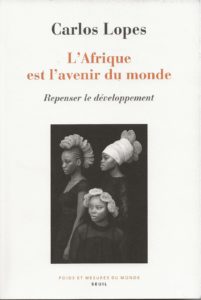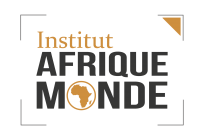Carlos Lopes, Africa is the future of the world, Rethinking development, Paris, Seuil, 2021.
 How should Africa envisage its future when the development model embodied by the West seems, today, to have reached a dead end? This is the question that Carlos Lopes answers in his book. In the preface, Alain Soupiot, honorary professor at the Collège de France, emphasizes that Africa must invent its own development model because “the future is what we create” and this is the path that the author is taking. Originally from Guinea Bissau, he is an economist, professor at the University of Cape Town and, at Sciences Po in Paris, he directed the UN Economic Commission for Africa in Addis Ababa. C. He recalls in his introduction that Africa had experienced fifteen years (the book was published in English in 2019 before the crisis caused by the Covid-19 pandemic) of significant economic growth (an annual rate of 5%) but which was fragile, the indicators giving only a blurred picture of a development that must take into account a significant population growth. The book is structured around eight major challenges, taking into account Africa’s history and the global context: reform of the political system, respect for diversity, public policies and their context, industrialization, agricultural productivity, revision of the social contract, climate change and relations with China.
How should Africa envisage its future when the development model embodied by the West seems, today, to have reached a dead end? This is the question that Carlos Lopes answers in his book. In the preface, Alain Soupiot, honorary professor at the Collège de France, emphasizes that Africa must invent its own development model because “the future is what we create” and this is the path that the author is taking. Originally from Guinea Bissau, he is an economist, professor at the University of Cape Town and, at Sciences Po in Paris, he directed the UN Economic Commission for Africa in Addis Ababa. C. He recalls in his introduction that Africa had experienced fifteen years (the book was published in English in 2019 before the crisis caused by the Covid-19 pandemic) of significant economic growth (an annual rate of 5%) but which was fragile, the indicators giving only a blurred picture of a development that must take into account a significant population growth. The book is structured around eight major challenges, taking into account Africa’s history and the global context: reform of the political system, respect for diversity, public policies and their context, industrialization, agricultural productivity, revision of the social contract, climate change and relations with China.
Democracy is the most sophisticated form of regulation of the political system and the question of democratization of politics is omnipresent in Africa. Colonization has obviously shaped its political system, state structures and people’s attitudes towards the state. In the colonial era, it was organized on two levels: a local level, which was under the authority of the “indigenous” authorities, often with ethnic rigidities, and governed by customary law; the central level, under the authority of the colonial authorities, was governed by civil law. C. Lopes considers that at the time of independence, the state was “deracialized” but not really democratized and access to its resources became the real political issue, often accompanied by ethnic rivalries, while the Cold War exacerbated the political tensions maintained by allegiances to the USSR or the United States. In the face of internal tensions, the existence of a single party was often seen in many countries as a means of maintaining national unity. Democratization has made real progress, but its consolidation requires respect for the rule of law, with the strengthening of parliament and the judiciary, and the prerogatives of civil society and the independence of the media.
The progress of its economy and the improvement of its governance have made Africa more ambitious and a new pan-Africanism has taken off, following the identity awareness of the 1930s-40s, marked by the creation of the Organization of African Unity in Addis Ababa in 1963, which became the African Union (AU). Pan-Africanism translates the will of Africans to act more together to counter the too often negative judgment that is made of Africa with visions fantasized by successful novels and articles in the Western press. This pan-African ambition comes up against the fact that the African state remains “Westphalian” (since the Treaty of Westphalia in 1648, European states have considered the sovereignty of the state to be absolute, protected from external interference). African countries rightly claim their sovereignty but often refuse internal migration, forgetting the richness of the diversity of peoples and cultures, and often violating the rights of minorities; the transformation of Africa will only be possible by promoting a common citizenship within and across borders, a long term task.
Economist C. Lopes denounces the “Washington Consensus” that dominated global monetary and financial policy for three decades, starting in 1980. Adopted by the international institutions created by the Bretton Woods agreements, in particular the IMF and the World Bank, influenced by the neo-liberal monetarist theses in progress in Washington, it inspired policies of fiscal austerity, the deregulation of financial markets, the liberalization of trade, and disinvestment in public policies. It is admitted today that “monetary adjustment” programs have had a strongly negative impact on the African economy, particularly on agriculture (the share of African exports in the agri-food sector has collapsed) and the policies inspired by the financial institutions have led to global crises. C. Lopes stresses the need to abandon the priority given to regulation by the market and to rebuild public policies, supporting sustainable development, and improving social protection with expertise and evaluation capacities, using indicators. In this perspective, he pleads for an industrialization of Africa and actions to increase agricultural productivity. Africa exports raw materials on a massive scale (hydrocarbons, minerals, agricultural products) without processing them, even though it has assets, agri-food being one of them (for example, cocoa processing). Industrialization would trigger a virtuous circle (he cites the example of Brazil): increased revenues from exports, financial returns for investment, job creation, lower unemployment, especially among youth. It would also protect the African economy from fluctuations in the price of raw materials. It can only succeed at the cost of proactive policies by States, with public investment, research and training, but also great vigilance in trade agreements that do not sufficiently protect African interests (for example, for cocoa, 60% of which is produced by Côte d’Ivoire and Ghana). Agriculture (65% of jobs) is also a priority sector with a majority of small unprofitable farms. Increasing their productivity is an imperative to increase farmers’ incomes, supply cities in a period of strong urbanization, and export processed products. The author suggests the creation of agricultural development banks to help small farmers (especially women), solidly managed and endowed with expertise, land distribution policies and the dissemination of agricultural techniques. He insists on the need to mitigate the consequences of global warming that Africa will face, especially its agriculture (90% of production is dependent on rainfall). In its industrialization, Africa, like other continents, will have to give priority to low-carbon energies, which will require significant investments. Hydroelectricity is obviously a resource, as well as the “blue economy”, i.e. marine energy, but the author is undoubtedly too optimistic on this point and, curiously, he does not mention the impact of the “decarbonization” of the world’s energy supply, which will greatly reduce hydrocarbon export revenues for countries such as Algeria, Angola and Nigeria.
The author devotes a chapter to revising what he calls the “social contract” of African countries, a concept he borrows from the philosopher Jean-Jacques Rousseau and from which he retains the timeless principle of respect for the inalienable rights of individuals and collective governance. Some of the ills that afflicted society at the time of Rousseau in eighteenth century Europe, poverty, inequality and infringement of freedom, are still present in Africa. A social contract must therefore strengthen the rule of law, but also promote the emergence of a mode of governance, on a global scale, that ensures the sustainable development of the planet. C. Lopes reminds us that the Earth Summit in Rio in 1992, with Agenda 21, gave the starting signal for a new development of the planet involving all local actors and respecting, as the economist Amartya Sen has emphasized, the Rousseauist ideal of freedom. The concept of sustainable development has acquired political legitimacy while still suffering from a certain vagueness, and it is therefore necessary both to specify the objectives it sets for the planet (the Agenda 2030 adopted by the UN in 2015 has contributed to this) and to organize multilateral action to achieve them. The author devotes his last chapter to relations with China, a spotlight that shows the importance of the role of the “Middle Kingdom” in African politics. China is indeed very present in Africa, where it has mining interests, is building large infrastructures, has launched cooperative ventures, particularly in medicine, and grants large loans, not without controversy. It is also forgotten that African communities are very present in China, nearly 100,000 Africans live in Guangzhou where they have an intense commercial activity. China is Africa’s leading trading partner, but it also considers Africa to be an important “pole” in a multipolar world (it is strongly represented at the UN) and is ready to share its skills, particularly technical skills, to participate in its development and reduce poverty by supporting regional integration. China is now banking on the development of its domestic market and C. Lopes sees this as both an opportunity and a risk for Africa: it will find outlets for its industry, but it will face increased competition from Chinese companies that are more competitive on international markets, especially in advanced technologies. China is an “obvious partner” for Africa, but the latter must find a negotiation strategy to influence its relations with this country, which has ambitions to play a major role in world geopolitics.
Lopes has an optimistic and ambitious vision of the future of Africa (“it is the future of the world” he announces in the title of his book). It is making progress, the youth of its population being an asset, but it faces important challenges, not the least of which are population growth and global warming. It still needs to consolidate democracy and ensure the cohesion of government policies while boosting regional cooperation so that pan-Africanism is not just a slogan. The author concludes that the seriousness with which Africans take up these challenges will determine not only the future of their continent but also that of the planet. All those interested in the future of Africa and its relations with the world, the raison d’être of the IAM, will read with great interest this book by an author committed by his work and his responsibilities in the implementation of a new “contract” for Africa. We only regret that it does not sufficiently take into account the major challenge of education, especially for girls, the key to Africa’s future.
Pierre Papon



